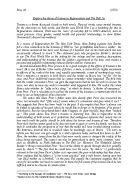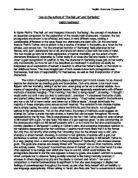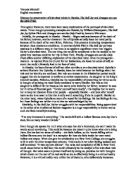Explore the theme of trauma in The Bell Jar and Regeneration
Roxy ☺ (1974)
Explore the theme of trauma in Regeneration and The Bell Jar
Trauma is a theme discussed closely in both novels. Physical events cause mental traumas for the characters in both works, and Barker uses World War I as a backdrop for this in Regeneration. Likewise, Plath uses the ‘wars’ of everyday life in 1960’s America, such as social pressure, class, gender, mental health and parental relationships, to show Esther Greenwood’s descent into madness.
In a review of Regeneration for The New York Times, Alan Riding explains how Barker felt a close connection to the traumas of WWI as “her grandfather had been a soldier…his war stories seemed all the more real because of a bayonet scar on his back which she was occasionally allowed to touch.” This statement puts into perspective Barker’s decision to use The First World War as the setting for her trilogy and her seamless descriptions and understanding of the traumas that the soldiers experienced at the time, and creates a personal and palpable relationship between Barker and her characters.
Second-Lieutenant Billy Prior proves to be a good example of the effects of trauma in the novel. He is one of Barker’s few works of fiction: a mute, a characteristic highly uncommon in officers of his rank at the time, and, equally uncommonly, a man of working-class roots. Prior’s mutism is a mystery to both Rivers and the reader as Rivers has “no file” for his case, and Prior stubbornly insists that he cannot remember what happened. The first time that the reader encounters Prior, we gain the impression that he has no wish to recover his voice, nor does he have any wish to remember what happened to him. We realise this when Rivers asks whether he “talks in his sleep,” at which he detects “a flicker of uneasiness” from Prior. Prior’s reluctance to recollect the events of his trauma is a mannerism which we come to see as being typical of his character.
We notice this when Prior’s father visits him shortly after Prior has recovered his voice, he insinuates that “[His voice] comes when it’s convenient and goes when it isn’t.” This suggests that Prior has been ‘mute’ in the past. It also implies that Prior’s silence can be linked to episodes of his past which he would like to forget or be forgotten; if he doesn’t talk about it, then he can pretend that it didn’t happen, or, quite literally, keep them “hushed up.” This point shows how Prior’s trauma is silencing him. This is imperative to the understanding of both novels as it symbolises that ambiguous opinions that society has on how much truth the public should be told about the horror and trauma of war. Therefore Prior feels that he cannot speak as he does not want to upset or worry his family, nor does he wish to contradict the perspective of war that the media will have created among civilians. His bitterness towards this is revealed when he mockingly says to Rivers: “I’m sorry to inform you that your son got caught in a shell explosion today and took five hours to die!” Here, the mockery comes from the fact that mere words seem to cheapen the reality of the ideas being expressed. This aspect can also be generalised to daily, more common ‘wars’ such as childbirth, as Plath indicates in The Bell Jar. However, The Wakefield Library Reader’s Group reviewed that Prior “has lost the ability to speak, through shock or possibly even by choice.” The fact that he could have lost his voice “by choice” is particularly relevant to the visit from Prior’s father as it represents the poor relationship that they share; Prior explains that his father is “a bar-room socialist” and a wife beater, having seen him “use [his] mother as a football,” in the past. But equally this statement suggests that he cares for his mother too much to want her to know the full extent of the trauma which he has suffered, and so he chooses to remain silent.








